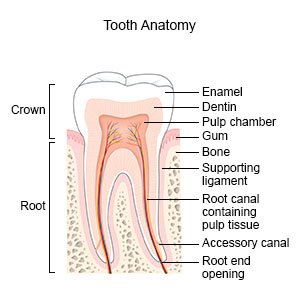Tooth Extraction
Medically reviewed by Drugs.com. Last updated on Apr 6, 2025.
What do I need to know about a tooth extraction?
A tooth extraction is a procedure to remove 1 or more teeth. Your healthcare provider will talk to you about how to prepare for this procedure. He or she will tell you what medicines to take or not take on the day of your procedure.
 |
What will happen during a tooth extraction?
Your dentist or oral surgeon may use medicine to numb the gum around the tooth and dull the pain. You may still feel pressure or pushing during the procedure. He or she may also give you medicine to keep you asleep and free from pain during the procedure. Your surgeon will first use a tool to loosen your tooth. When the tooth is loose enough, the surgeon will use forceps to pull the tooth out. He or she may rinse the site with a sterile solution. The surgeon will apply gauze on the extraction site and ask you to bite down to help control bleeding.
Drugs used to treat this and similar conditions
Vibramycin
Vibramycin is used for acne, actinomycosis, amebiasis, anthrax, anthrax prophylaxis, bacterial ...
Omvoh
Omvoh is used to treat moderate to severe ulcerative colitis or Crohn's disease in adults. This ...
Doxy 100
Doxy 100 is used for acne, actinomycosis, amebiasis, anthrax, anthrax prophylaxis, bacterial ...
Minocycline
Minocycline is used to treat infections, such as urinary tract infections, acne and chlamydia ...
Hydrocortisone topical
Hydrocortisone cream is used to treat eczema, dermatitis, psoriasis, hemorrhoids, insect bites or ...
Doryx
Doryx is used for acne, actinomycosis, amebiasis, anthrax, anthrax prophylaxis, bacterial ...
What will happen after a tooth extraction?
You may have light bleeding for up to 12 hours after your procedure. You may also have pain, swelling, and trouble opening your mouth completely.
What are the risks of a tooth extraction?
- You may bleed more than expected or get an infection. You may have trouble fully opening your mouth for a longer period of time than expected. You may develop dry socket. Dry socket is a condition that prevents a blood clot from forming on the extraction site as it should, or it gets dislodged. Dry socket can cause severe pain. A part of the bone that holds your tooth in place may be broken during the tooth extraction. This can cause your upper and lower teeth to become misaligned. It can also lead to an infection or tingling or numbness.
- The top part of your tooth may break while it is being pulled. Your surgeon may need to cut your gum or part of your bone to remove the rest of the tooth. The nerve near the root of your tooth may be injured during this surgery.
Care Agreement
You have the right to help plan your care. Learn about your health condition and how it may be treated. Discuss treatment options with your healthcare providers to decide what care you want to receive. You always have the right to refuse treatment. The above information is an educational aid only. It is not intended as medical advice for individual conditions or treatments. Talk to your doctor, nurse or pharmacist before following any medical regimen to see if it is safe and effective for you.© Copyright Merative 2025 Information is for End User's use only and may not be sold, redistributed or otherwise used for commercial purposes.
Further information
Always consult your healthcare provider to ensure the information displayed on this page applies to your personal circumstances.
